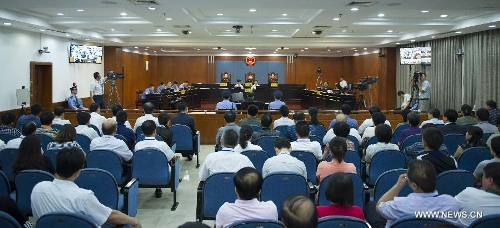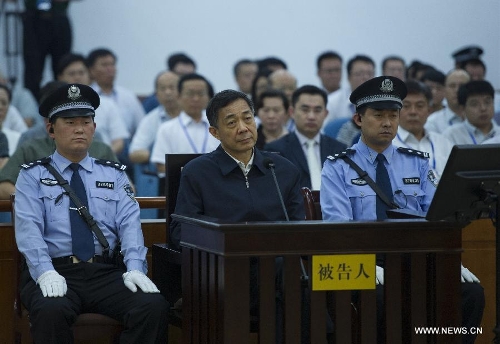Prosecutors demand heavy penalty for Bo

Photo taken on Aug. 26, 2013 shows the court trial of Bo Xilai at Jinan Intermediate People's Court in Jinan, capital of East China's Shandong Province. The trial of Bo, charged with bribery, embezzlement and abuse of power, concluded at 1:04 p.m. Monday at the court. The verdict will be announced at a date yet to be decided. (Xinhua/Xie Huanchi)

Photo taken on Aug. 26, 2013 shows the court trial of Bo Xilai (C, front) at Jinan Intermediate People's Court in Jinan, capital of East China's Shandong Province. The trial of Bo, charged with bribery, embezzlement and abuse of power, concluded at 1:04 p.m. Monday at the court. The verdict will be announced at a date yet to be decided. (Xinhua/Xie Huanchi)
A heavy sentence in line with the law should be handed down to Bo Xilai, as he committed "very serious crimes" and refused to plead guilty, said prosecutors as the five-day trial of the former Chongqing Party chief ended Monday in the eastern city of Jinan.
The Jinan Intermediate People's Court said it will announce the verdict for Bo, charged with bribery, embezzlement and abuse of power, at a date to be decided.
During Monday's trial, prosecutors reaffirmed that they have presented enough evidence to prove that Bo took more than 21.8 million yuan ($3.56 million) in bribes from two businessmen and embezzled 5 million yuan of public funds in Dalian and abused his power during the investigation of his wife Bogu Kailai's homicide of British citizen Neil Heywood.
"Bo's defense was not grounded in facts and his arguments were plain and weak," prosecutors said, adding that Bo even denied testimony by witnesses while degrading their dignity.
Bo, 64, said he should take part of the responsibility for his wife Bogu Kailai receiving money and property, but denied the charges of bribery and embezzlement.
Bo also denied the charge of abusing his power, on which he allegedly stopped his wife's homicide investigation and unlawfully removed former Chongqing police chief Wang from his position, leading to Wang's defection to a US consulate.
While defending himself on the charge of abusing his power, Bo claimed that Wang had secretly been in love with Bogu Kailai. Bo admitted that he made a mistake by slapping Wang but said this move could not turn a man into a "traitor."
He said Wang was aware that he had invaded Bo's family life and hurt his feelings, and that was the reason why Wang decided to defect.
Li Zhuang, a former lawyer and a famous critic of Bo, told the Global Times that Bo was telling this side story as a strategy to lower the credibility of Bogu Kailai and Wang, as both Wang and Bo's wife provided testimony to prove accusations against Bo.
Li added the prosecutors could also have charged Bo with covering for a criminal. Bo said he did not believe his wife was a murderer, and said he removed Wang from his position because of Wang's bad personality and past record.
Qin Qianhong, a professor of constitution law with Wuhan University, said that the attention on this open case is unprecedented, which provided a good lesson for many to get a closer look at China's court system that some used to lack confidence in.
"Bo fully expressed himself at the court, getting rid of many people's previous hypothetical guesses that the defendant was on the weak side and had no right to defend himself," Qin said.
On Monday morning, the defendant made a 90-minute-long statement defending himself, followed by his lawyers' defending statement.
"The five-day trial provided chances for both prosecutors and defendant to fully give their opinions … and Weibo had continuous reports of the trial, showing the authorities' determination to make clear the facts and pursue justice, and it also made me more confident of the future of the Chinese judicial system," Bo said in his closing statement.
The trial also established a model for local courts in terms of openness and transparency and encouraged defense lawyers to fulfill their duty in sensitive cases, Qin said.
However, some pointed out that the trial for Bo's economic crimes and abuse of power may not address the full damage Bo caused during his terms in various government positions.
Chongqing's controversial anti-gang crime campaign started by Bo and Wang in 2009, for example, led to the arrest of more than 3,000 suspects, including government officials, police officers and entrepreneurs. Many of the people arrested later proved to be victims of the hasty storm that followed a whim of the leaders instead of strict legal procedures, said Li Xiaolin, a Beijing-based lawyer who has represented Zhang Xiaojun, an assistant of Bo's family.
"A batch of private enterprisers went bankrupt and severely hurt the Chongqing economy," he said.